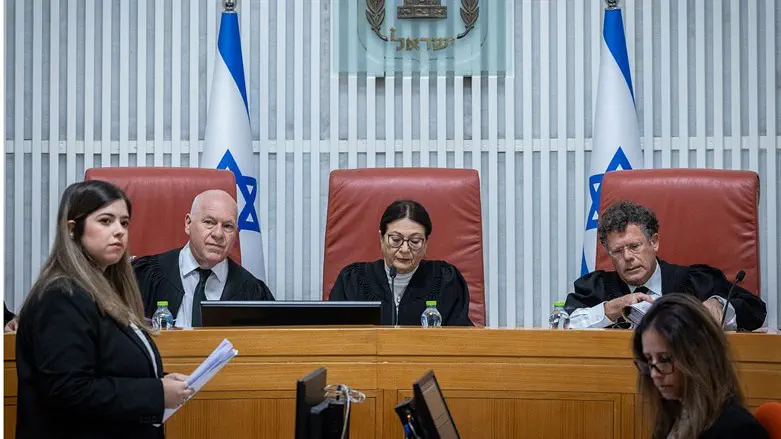
The Israeli Supreme Court this evening (Monday) published its ruling striking down the 'Reasonableness Standard Law,' the amendment to 'Basic Law: The Judiciary' which limited the court's ability to apply the subjective 'Reasonableness Standard' to strike down Knesset-passed laws or government decisions.
The move marks a historic shift in the balance of power in Israel, as it is the first time the Supreme Court has ever struck down part of a Basic Law, laws which have quasi-constitutional status in Israel and were considered the source of the court's judicial review authority.
An unprecedented full panel of all 15 Supreme Court Justices heard the petitions against the Reasonableness Standard law, the only major element of the government's previously planned judicial reforms which was brought to a vote and successfully passed last year.
The court's decision to publish the decision now has been heavily criticized for risking reopening rifts within the country while Israel remains at war with the Hamas terrorist organization in Gaza following the Hamas massacre of 1,400 people, 1200 of them civilians, on October 7. The vote was 8-7, a majority of one, leading to further criticism that this unprecedented move should not have been passed without greater consensus among the judges. However, outgoing Chief Justice Esther Hayut wished the law to be struck down under her watch and had only until the end of next week to sign court decisions.
The judges who voted in favor of striking down the law were Esther Hayut, Isaac Amit, Anat Baron, Ofer Grosskopf, Uzi Vogelman, Dafne Barak-Erez, Khaled Kabub, and Ruth Ronnen.
The judges who voted against striking down the law were Yechiel Kasher, Noam Sohlberg, Yosef Elron, Alex Stein, Yael Willner, David Mintz, and Gila Canfy-Steinitz.
President Hayut wrote in her decision: President Hayut wrote "The authority of the Knesset in its capacity as a constituent authority is not unlimited and it is not authorized to enact a Basic Law that denies or directly contradicts the characteristics of Israel's basic identity as a Jewish and democratic state. This conclusion is learned from the constitutional data as it has developed since the early days of the state."
Twelve judges ruled that the Supreme Court could overturn a Basic Law, including five judges who voted against overturning the Reasonableness Standard law.
The Reasonableness Standard allows the court to strike down laws and government actions based on the subjective view that no 'reasonable' legislature or government would act in such a manner rather than based on established legal principles and precedents.
The government had argued that the court would abrogate to itself supreme power if it took the unprecedented step of striking down a Basic Law, overriding the will of the people and all democratic standards.
Opponents of the Reasonableness Standard law argue that the standard as it was before the amendment is a necessary check on the government's authority and protects the rights of minorities. The attorney general, an appointee of the previous government, supported the petitions against the law.
